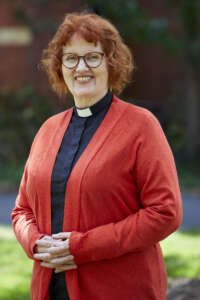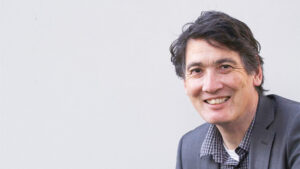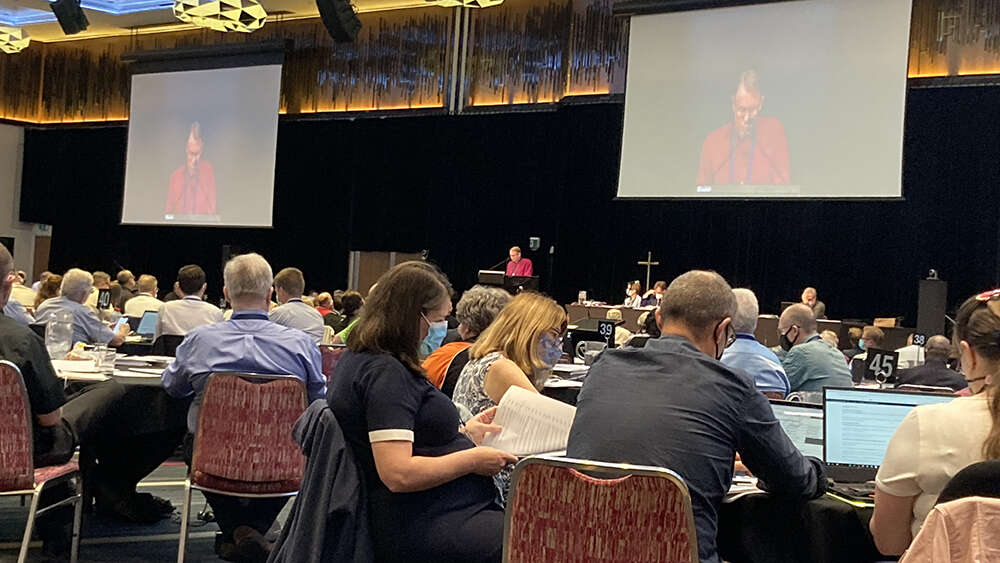Do conservative and progressive Christians agree on 90 per cent of what we believe?
And what about the other 10 per cent?
A striking comment by a leading academic should give Christians of all shades of opinion something to think about.
Professor Dorothy Lee of the University of Divinity made the statement to members of the recent Anglican General Synod (GS). The GS was divided mainly into progressive and conservative groupings around the issue of blessings of civilly married same-sex couples. Lee told the Synod that members of the meeting agreed on 90 per cent of doctrines.
Because it was only a brief comment, it left hanging the intriguing question of what the 90 per cent consisted of. So Eternity asked her to elaborate, which she kindly has.
Despite being made in an Anglican environment, Lee’s comment applies to a wide variety of church networks that contain a mix of theologies.
The “unity” motion that Lee seconded and on which she gave her speech failed. We’ll comment on that later.
Professor Lee on the ninety per cent.

Professor Dorothy Lee © Kit Haselden Photography courtesy of Trinity College, University of Melbourne
For some reason, we Anglicans have trouble agreeing to disagree and respecting viewpoints that are not our own. Perhaps this is a wider human problem. But, given the current threats to the unity of our church in Australia, it has become an issue of key import. Without the ability to hold together in a spirit of charity and humility, we could splinter into a thousand pieces. Not just into two: catholic and evangelical; but also into the differences that each body contains within it, not to mention the decreasing number of broad church Anglicans who identify with neither of the major ‘factions’.
When we look more carefully, we can rediscover the breadth of what we hold in common. As Anglicans, we are committed to a number of core beliefs that we all share:
- Our theology is quintessentially Trinitarian, with a strong commitment to that unity of Persons, intimate and coherent, which dwells at the heart of all reality, is sovereign, and holds all things in being.
- In line with our Trinitarian framework, we are committed to the full humanity and divinity of Jesus Christ, who became incarnate through the Holy Spirit and blessed Mary.
- We believe in the saving efficacy of Jesus’ life and ministry, which recapitulates our own human story and presents it whole before God; in Jesus’ sacrificial and atoning death to bring the dominion of sin and death to an end, and in his resurrection from the dead, leaving the tomb empty, as acclaimed by his disciples, female and male.
- We believe that grace is the basis on which we enter into relationship with God, a relationship that also connects us to one another in the church and to all creation.
- Our hope is in the guidance of the Holy Spirit, who makes Jesus present to us as we struggle to be a sign of the kingdom: the future reign of God and the final advent of Christ.
- As Anglicans, we are committed to the threefold order of ministry.
- Our faith and hope are nurtured above all else by Scripture as the God-breathed source of our life together and by the two dominical sacraments, Baptism and Holy Communion.
- We acknowledge our dependence on the past traditions of the church catholic, particularly the ecumenical creeds and the insights of the early Patristic writers, and also the Reformers of the 16th century who renewed the church and called on us to be a church always reforming itself.
- We are committed as disciples of Jesus to living a life of self-giving service to others, evangelising and engaging in mission — in both word and deed — which is directed both at personal conversion and structural transformation, part of which is taking responsibility for the stewardship of the good earth God has given us.
- We believe in living together in community in whatever form God calls us —marriage and children, singleness, consecrated religious life, friendship — recognising and supporting the deep bonds that unite us to one another and to our sisters and brothers in the church.
That is not only a long list of commonalities. It is also a momentous one and to be measured in weight rather than counted: making up at least 90 per cent of the totality of what we believe as Anglican Christians. Within it, and perhaps at each point, there are unquestionably disagreements and differences of emphasis and priority, but the core we can hold together and celebrate. It is this unity that needs to be given centre-stage and needs also to be the basis on which we dialogue on matters of difference.
None of this is to say that our differences are matters of indifference without consequence. Rather, it is the recognition that none of us possesses the whole truth and that, under the guidance of the Spirit, we need to listen to one another, learn from one another, and be prepared to change or modify our views in order to strengthen, deepen and widen our unity. But, above all, we gather together to discuss these matters in mutual love of our Lord Jesus Christ, whose loving authority and guidance we constantly seek.
Rev’d Prof Dorothy A. Lee FAHA, Trinity College, University of Divinity
So why did that unity motion fail?
As Lee pointed out to me, her list is somewhat like the Nicene Creed, a near-universally-held affirmation of the common beliefs of Christians. So it may be a puzzle to readers as to why the unity motion Lee endorsed failed at the General Synod. There is a core issue about how Christians disagree that lies behind this.
Bishop Matt Brain from Bendigo moved the motion with Lee seconding it – and most observers would put those two on either side of the divide at the conference. The motion read:
“That this General Synod
a) acknowledging that there are several theological and spiritual cultures within The Anglican Church of Australia,
b) recognising that the persons within each culture adhere to it for reasons of belief conscientiously held in adherence to Holy Scripture as well as social identity, and
c) welcoming the strengths that our diverse unity brings, therefore calls on all Anglicans regardless of their cultural identity to:
d) respect one another’s cultures,
e) build on what we hold in common,
f) affirm that the separation of any one of us diminishes us all, and
g) where we differ seek, ‘in the spirit of Philippians 3:13, “forgetting what lies behind and straining forward to what lies ahead”, to discover each other’s faith as it is today and to appeal to history only for enlightenment, not as a way of perpetuating past controversy’ * so that the gospel we proclaim may be attractive to the widest range of Australians to whom we seek to minister.
*From the aims of the Anglican-Roman Catholic International Commission (ARCIC I) accessed 6 March 2022.
Mark Thomson, Principal of Moore Theological College, which trains the ministers of the Sydney Diocese, moved an amendment that added a summary of what might have been held in common to the top of the motion.
“This General Synod
“a. Rejoices in the Christian faith professed by the Church of Christ from the time of the New Testament, and in particular set forth in the Creeds;
“b. Joyfully recommits to respectful and reverent reading, teaching and preaching of the canonical Scriptures as our ultimate rule and standard of faith, inspired by God and containing all things necessary for salvation;
“c. and humbly re-expresses its determination to obey the commands of Christ and teach his doctrine as these are given to us in Scripture.”
To this possibly naive observer, that seemed a mild formulation. A more robust affirmation on, say, the Bible than Lee’s elaboration of her 90 per cent might have been desired by the conservatives. But Thompson did not go anywhere near terms such as “infallibility” or “inerrant” – words describing the Bible that he might discuss at Moore.
The amendment narrowly passed, 119 for and 113 against, which caused quite a ripple on the left-hand side of the room.
But then a leading progressive, Associate Professor Matthew Anstey from Adelaide, immediately moved “the previous question:” that the motion not be put. The ayes had it. The motion not to put the motion passed on the voices.

What are the ‘must-haves’ for you? John Sandeman asks
Some conservative writers have interpreted this as progressives objecting to Thompson’s points, but I suspect the second leg of his amendment played a role.
Do progressives who support same-gender marriage in the church … respect the theological culture of the conservatives who have different views?
The original motion said there were “several theological and spiritual cultures within The Anglican Church of Australia” and later called “on all Anglicans regardless of their cultural identity to … respect one another’s cultures [and] build on what we hold in common.”
Thompson’s amendment removed the word “theological.”
The progressives called for something called “comprehensive Anglicanism”, for the progressives and conservatives to live together.
“Comprehensive Anglicanism” is built upon the ideas of the 19th-century Christian Socialist F. D. Maurice, a leader of the “broad church movement”. Progressive leaders in the Anglican church in Australia, such as Archbishop Phillip Aspinall of Brisbane and Newcastle’s Bishop Peter Stuart, are re-popularising the term.
But do progressives who support same-gender marriage in the church, and interpret the Bible in a manner that allows for that, respect the theological culture of the conservatives who have different views? And the other way around?
The ripples from the debate within the Anglicans over same-gender blessing have just begun. The Bishop of Gippsland in Victoria has declared to his Synod (local church parliament) that “there is no obstacle” to blessing same-sex marriages in the Anglican Church of Australia. Other louder voices will join in as more Synods are heard.
Canadian and New Zealand conservatives decided that this was the moment to break away from their traditional Anglican churches to start new ones.
What are the “must-haves” or “must-not-haves” for you? That is a crucial question for Christians in many denominations.
Email This Story
Why not send this to a friend?



